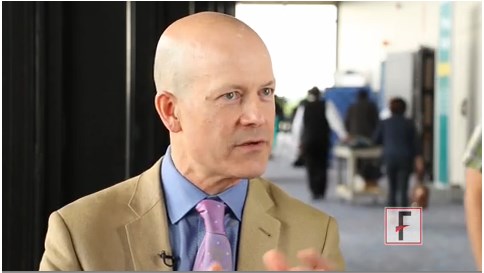User login
CHICAGO – The largest precision oncology trial ever will use genomic analysis of tumors to match patients with optimal therapies.
In the National Cancer Institute’s Molecular Analysis for Therapy Choice (NCI-MATCH) trial, patients will undergo biopsy with genomic analysis of their tumors to identify specific molecular abnormalities and then be assigned to the most relevant targeted therapy available, including both currently marketed drugs and investigational agents.
In a video interview, the study’s coprincipal investigator, Dr. Keith T. Flaherty of Massachusetts General Hospital in Boston, described the promises and challenges of translating oceans of data into solid therapeutic responses to difficult-to-treat cancers.
The video associated with this article is no longer available on this site. Please view all of our videos on the MDedge YouTube channel
CHICAGO – The largest precision oncology trial ever will use genomic analysis of tumors to match patients with optimal therapies.
In the National Cancer Institute’s Molecular Analysis for Therapy Choice (NCI-MATCH) trial, patients will undergo biopsy with genomic analysis of their tumors to identify specific molecular abnormalities and then be assigned to the most relevant targeted therapy available, including both currently marketed drugs and investigational agents.
In a video interview, the study’s coprincipal investigator, Dr. Keith T. Flaherty of Massachusetts General Hospital in Boston, described the promises and challenges of translating oceans of data into solid therapeutic responses to difficult-to-treat cancers.
The video associated with this article is no longer available on this site. Please view all of our videos on the MDedge YouTube channel
CHICAGO – The largest precision oncology trial ever will use genomic analysis of tumors to match patients with optimal therapies.
In the National Cancer Institute’s Molecular Analysis for Therapy Choice (NCI-MATCH) trial, patients will undergo biopsy with genomic analysis of their tumors to identify specific molecular abnormalities and then be assigned to the most relevant targeted therapy available, including both currently marketed drugs and investigational agents.
In a video interview, the study’s coprincipal investigator, Dr. Keith T. Flaherty of Massachusetts General Hospital in Boston, described the promises and challenges of translating oceans of data into solid therapeutic responses to difficult-to-treat cancers.
The video associated with this article is no longer available on this site. Please view all of our videos on the MDedge YouTube channel
AT THE ASCO ANNUAL MEETING 2015
